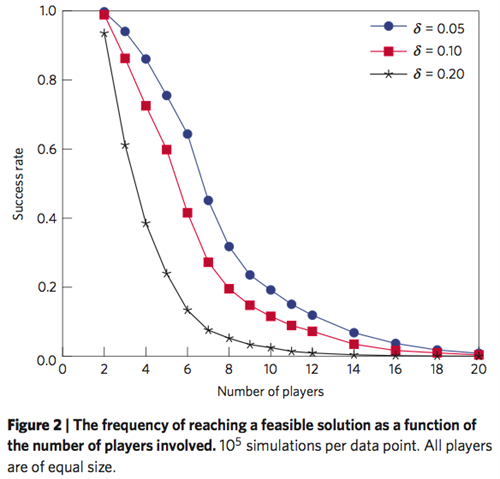Mat Hope
11.05.2014 | 6:00pmIt’s a familiar story: hundreds of countries meet in a conference hall to bash out a new international agreement to combat climate change. After two weeks of arguments and head scratching, little is resolved. But changing how countries approach the negotiations could change all that, new research suggests.
To get a better understanding of why the annual United Nations Framework Convention on Climate Change (UNFCCC) negotiations consistently end in a fug, three US academics turned to game theory – a political science approach built on simulating rational decisionmaking. In a new paper published in Nature Climate Change today, they argue that a few tweaks to how countries approach the negotiations could “significantly change the likelihood of success”.
Why negotiations fail
The researchers built a model simulating the UNFCCC process. After running the model tens of thousands of times, thy identified three main problems.
First, they found that the chances of success decreased as more countries came to the table. That’s because fewer participants means less disagreement, and finding a solution all participants can accept is much simpler. Which could explain why some countries, such as the US, often pursue bilateral deals outside of the UNFCCC process.
This graph shows how the chances of success (the y-axis) improve when fewer participants are involved in the negotiations (the x-axis), according to the model:
But it’s not just the number of participants that matters. Agreement was also much harder to come by when countries’ different emissions levels were taken into account, the researchers found. That’s because the ‘players’ no longer started on an even footing, the researchers say – making the negotiations much more complex.
Such difficulties could be seen playing out at the most recent UNFCCC meeting in Warsaw as small states – most prominently the Philippines’ delegation – demanded action from richer nations. In particular, a split which occured over a proposed ‘loss and damage’ mechanism was considered to be a major obstacle to forging an overarching deal.
Countries’ expectations at the outset also had a profound effect on the negotiations. The model found that if too many countries started with big demands, negotiations normally ended in failure. That’s because the more countries ask of each other, “the more collective action it takes to reach the target”, the researchers say.
Improvements
So how could countries overcome these barriers? By adjusting how they play the game, the researchers say.
For starters, the model suggests larger countries should be prepared to make bigger concessions. As large countries have higher emissions, “adjustments on their part tend to make up a more substantial part of reaching the reduction target”, the paper says. That means countries with big emissions – such as the US, China, and those in the EU – “should expect to make larger proportional reduction commitments in successful negotiations”, the researchers say.
Countries could also help the common cause by making side-deals before the major negotiations start. The model suggests such agreements can be particularly effective when small countries team up. So while a bilateral deal between the US and China could help things along, a deal between the Association of Small Island States and some of Europe’s smaller players could prove to be more fruitful in the long run.
Realistic expectations are also vital to the negotiations’ chances of success, the researchers argue. Their model shows that if countries arrive at the negotiations expecting too much, they’re likely to leave empty handed. So when some countries appear reluctant to sign up to an ambitious deal prior to the talks, negotiators should adjust their ambitions accordingly.
“Unless the conditions of the UNFCCC negotiations change dramatically, future success is doubtful”, the researchers conclude. But by changing how the game is played – with more side-agreements, large nation leadership, and realistic expectations – countries could yet strike a deal.
Update, 12/05/14, 16:45 - The statement about the role of the Phillipines and the loss and damage mechanism dispute in Warsaw was clarified.


